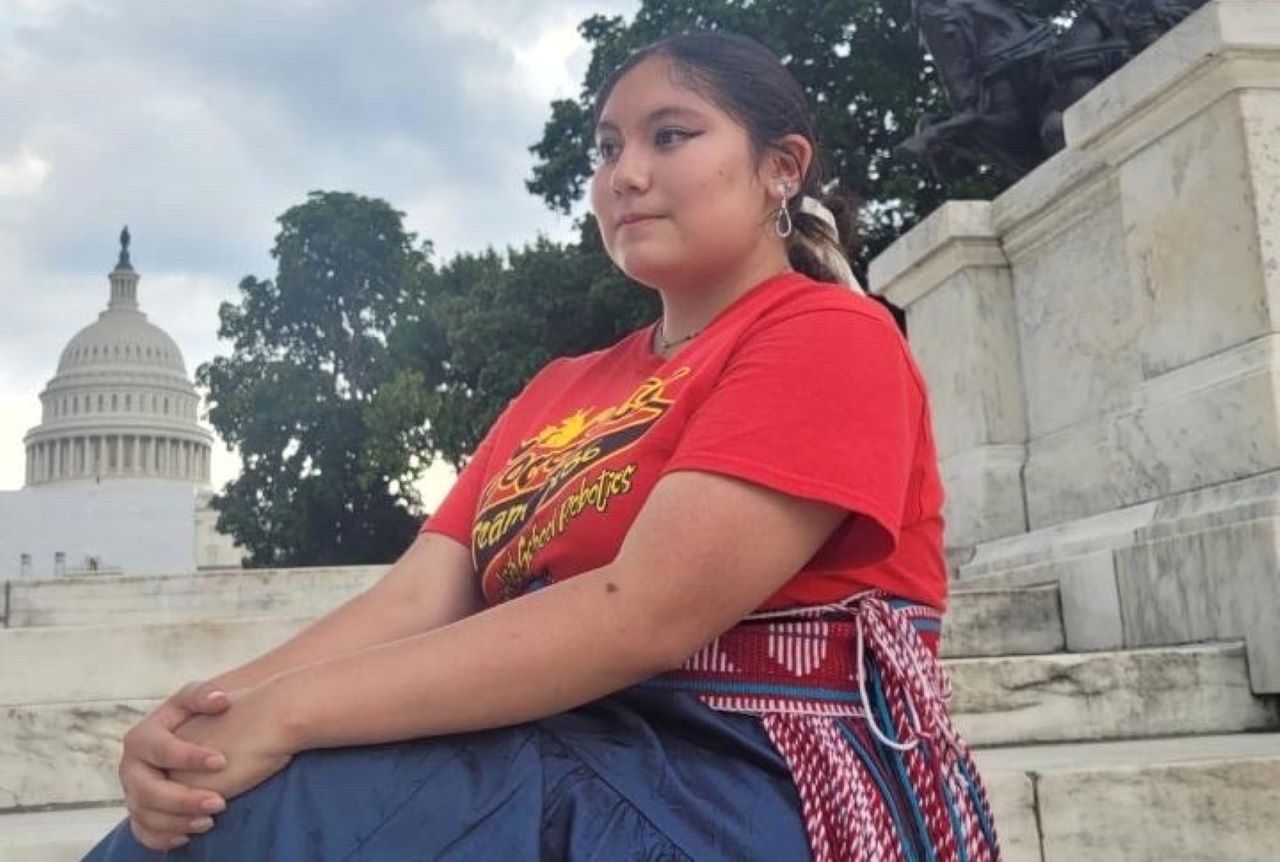Meet Alicia
Flagstaff, Arizona is a city focused on bringing STEM opportunities to students. Their community has always had a love for STEM, and they recognize that more access to STEM programs brings better opportunities for student learning, growth, and confidence. However, once you step outside of Flagstaff and into its surrounding areas, you’ll realize that not everyone has the same access or opportunities to these impactful programs. Specifically, the Diné (Navajo) people near Flagstaff simply do not have the same kind of access to STEM due to where they are located.
The Diné reservation outside of Flagstaff is remote, and youth residents must travel more than two hours each way to get to school. This leaves little time for students to participate in extracurricular activities and when there is time, resources are limited. These challenges are not unique to just the Diné nation and these factors along with others result in the underrepresentation of Indigenous people in the STEM fields. Flagstaff is home to FIRST® Robotics Competition Team 2486 “CocoNuts” who has recognized the disparity in access and has been actively working to close the STEM gap between these communities.
The CocoNuts are activating change by making sure that every child who wants to participate in STEM can. Through outreach activities and securing grants for funding, they hold professional development trainings with FIRST® coaches and teachers as well as provide extensive mentorship for FIRST® LEGO® League, FIRST® Tech Challenge and FIRST Robotics Competition teams in their region. The CocoNuts also volunteer their time on the reservation and encourage students to get involved with STEM. Last year, they were awarded the Equity and Access Grant through FIRST which has allowed mentors to travel to Navajo schools to provide them with even more support.
We had the chance to hear from Alicia, a young Navajo woman, who was inspired to pursue STEM by the CocoNuts at a young age and is now part of the team. Because of the CocoNuts initiatives, she is now a Dean’s List Finalist and is the Flagstaff STEM Student of the Year.
Keep reading to learn more about her experience.
FIRST Staff: What is it like for students growing up on the Navajo reservation outside of Flagstaff, Ariz.?
Alicia: I personally do not live on the Diné [Navajo] reservation, but I can tell you what my family and friends have gone through. On the reservation in small communities like Leupp (a community on the Navajo reservation), many students don’t have access to the internet, travel several hours to get to school, and in some areas don’t have electricity or running water.
FIRST Staff: Do you remember the first time you were introduced to Team CocoNuts? What was it like?
Alicia: I was in our town's local mall for an event. My mother saw robots and led me in that direction. I was allowed to drive the robot and shoot balls into the bin. One of the team members said, “Wow! You're really good at driving the robot!” Since then, I’ve been so excited to join the CocoNuts.
FIRST Staff: How has STEM and FIRST impacted your life?
Alicia: FIRST has brought me so many opportunities from internships to making friends from around the world. FIRST has also given me a direction in a STEM career. The CocoNuts have given me a rope to climb on and showed me that I can go to college.
FIRST Staff: What makes you feel empowered?
Alicia: What makes me feel empowered is both my culture and seeing the youth of my people smile with joy interacting with STEM. I love telling stories of my people and their past. Seeing these proud leaders makes me want to try harder and keep their stories alive. I also mentored a student a few years ago on how to code a website, he was so happy about showing off his project to the point where he could not stop smiling.
FIRST Staff: How can the FIRST community help bring STEM to other underserved communities?
Alicia: The FIRST community can help bring STEM to communities like ours by helping us advocate in their local community or state/nationwide. Even introducing the idea [of STEM education] to our communities and getting the young kids interested in STEM will make a difference.
FIRST Staff: What skills have you gained through FIRST?
Alicia: The skills I have gained through FIRST are to be able to hold business relationships, to be able to present in front of a crowd, and to grow my communication skills.
FIRST Staff: What advice do you have for students who want to get involved in STEM but don’t know where to start?
Alicia: What I recommend is talking to teachers, parents, adults, students, and elders. Talk to them and show them that,” I want this at my school” show them the opportunities of these programs. And most importantly, don't be afraid to tinker!
FIRST Staff: What is your dream job?
Alicia: My dream job is to be an Environmental Engineer or an Environmental Scientist at NASA.
FIRST Staff: Is there anything else you’d like to share or that you’d like the FIRST community to know?
Alicia: When approaching our communities, learn our history. It shows that you are willing to hear them out and connect with them. When starting teams/STEM clubs, let them have a choice in everything. Be there to help and mentor them.
